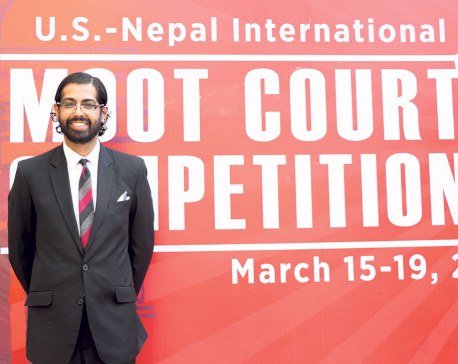
OR
Immunity for President
In principle, ceremonial heads of state should keep themselves away from all controversies, by strictly sticking to the role prescribed to them by the constitution. In practice, there have been many instances in the past when the ceremonial heads of state of Nepal have overstepped their constitutional bounds. Perhaps the most egregious case was that of King Gyanendra when he illegally assumed all executive powers in 2005 citing the failure of the political parties to hold elections. Then, in 2009, President Ram Baran Yadav—who, like Gyanendra, was also a ceremonial head of state—controversially overturned the decision of Prime Minister Pushpa Kamal Dahal to dismiss the then army chief Rookmangud Katawal. PM Dahal had to subsequently resign in disgrace. In an unstable polity like Nepal, there is always the risk of the nominal heads trying to exceed their constitutional bounds, of their own accord, or under the influence of various forces they are beholden to. This is why they should not have the immunity to do so. Yet the caretaker government of Dahal has recently registered a bill in parliament that would grant life-long immunity against criminal prosecution to all serving and retired Presidents and Vice-presidents.
Perhaps the government reasoning is that it is unseemly to unnecessarily drag the hallowed offices of the President and Vice-president, who, in any case, are ceremonial, into controversy. But the bill could very well have the opposite effect, spurring the President or Vice-president to act illegally whenever it suits them. The new bill also seems to go against a Supreme Court precedent. In 2010, the court, hearing on a petition against President Yadav’s alleged meddling in the firing of the army chief, had ruled that “since the constitution has not given any impunity or prerogative, questions can be raised with regard to any act carried out by the president in the capacity of head of state and such questions should be settled by the court.” As the new constitution, just like the interim constitution it replaced, is also silent on whether a legal case can be filed against head of state, the 2010 verdict is still applicable. Yet things aren’t so straightforward. In other cases—for instance those related to extension of the tenure of the first Constituent Assembly and the impeachment of Lokman Singh Karki—the apex court has also refused to register cases against the head of state, again in the belief that the ceremonial President should not be dragged into controversy.
So whether or not the President or Vice-president can be incriminated depends on discretion of individual judges. In our view, there can be no justifiable reason for keeping these two top public officeholders above the law. If they overstep law, they should be liable to same kind of criminal prosecution that would apply to any other Nepali citizen. In fact, as the office of the ceremonial head has been so often abused in Nepal, the constitution should clearly state that its occupant can be punished for misconduct. It is up to the occupants of those offices to prove, through their conduct, that they are willing to stay within their legal bounds. Granting them immunity from prosecution, we are afraid, will only increase the chances of the kind of costly political adventurism that has so bedeviled Nepal since the restoration of democracy in 1990.
You May Like This

Cash fine of up to Rs 200,000 proposed for misconduct by online business operators
KATHMANDU, Jan 3: The government has sought to fine up to Rs 200,000 those traders who carry out online business... Read More...

International law in Nepal is as important as domestic law: Prof Husain
The three-day US-Nepal International Moot Court Competition concluded on Sunday, announcing winners in different categories. Six teams representing six different... Read More...

Kathmandu School of Law wins 58th Jessup International Law Moot Court Competition
KATHMANDU, March 7: Kathmandu School of Law won the national round of the 58th Philip C. Jessup international Law Moot Court... Read More...





Just In
- CM Kandel requests Finance Minister Pun to put Karnali province in priority in upcoming budget
- Australia reduces TR visa age limit and duration as it implements stricter regulations for foreign students
- Govt aims to surpass Rs 10 trillion GDP mark in next five years
- Govt appoints 77 Liaison Officers for mountain climbing management for spring season
- EC decides to permit public vehicles to operate freely on day of by-election
- Fugitive arrested after 26 years
- Indian Potash Ltd secures contract to bring 30,000 tons of urea within 107 days
- CAN adds four players to squad for T20 series against West Indies 'A'













Leave A Comment